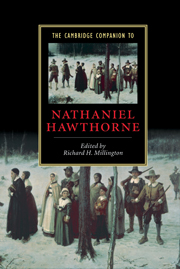Book contents
- Frontmatter
- Introduction
- 1 Hawthorne’s Labors In Concord
- 2 Hawthorne as cultural theorist
- 3 Hawthorne and American masculinity
- 4 Hawthorne and the question of women
- 5 Hawthorne, modernity, and the literary sketch
- 6 Hawthorne’s American history
- 7 Hawthorne and the writing of childhood
- 8 Love and politics, sympathy and justice in The Scarlet Letter
- 9 The marvelous queer interiors of The House of the Seven Gables
- 10 Sympathy and reform in The Blithedale Romance
- 11 Perplexity, sympathy, and the question of the human: a reading of The Marble Faun
- 12 Whose Hawthorne?
- Selected bibliography
- Index
- Series list
3 - Hawthorne and American masculinity
Published online by Cambridge University Press: 28 May 2006
- Frontmatter
- Introduction
- 1 Hawthorne’s Labors In Concord
- 2 Hawthorne as cultural theorist
- 3 Hawthorne and American masculinity
- 4 Hawthorne and the question of women
- 5 Hawthorne, modernity, and the literary sketch
- 6 Hawthorne’s American history
- 7 Hawthorne and the writing of childhood
- 8 Love and politics, sympathy and justice in The Scarlet Letter
- 9 The marvelous queer interiors of The House of the Seven Gables
- 10 Sympathy and reform in The Blithedale Romance
- 11 Perplexity, sympathy, and the question of the human: a reading of The Marble Faun
- 12 Whose Hawthorne?
- Selected bibliography
- Index
- Series list
Summary
The governing paradox
Hawthorne lived out the classic story of masculine success in America, overcoming early hardship to achieve wealth and fame. Orphaned by the death of his father when he was four years old, he was reared in the household of his mother's family, and lived in near-poverty for most of his life: only at age forty-eight was he able to afford a home of his own. College life at Bowdoin gave Hawthorne friendships with some of the most prominent men of his time, notably Franklin Pierce and Henry Wadsworth Longfellow, but did not prepare him for the profession he chose. Becoming a writer was a long struggle, requiring Hawthorne to surmount recurrent frustration and periods of acute self-doubt, as well as severe financial hardship. But at the end of his life, in 1864, Hawthorne was well-to-do and his writings were counted among the masterpieces of world literature. Hawthorne's intimate friends and relations hailed him as an exemplar of true manliness, distinguished by the “military self-command” that had seen him through the hardships and yielded so spectacular a triumph.
Yet a desolating sense of unreality plagued Hawthorne throughout this classic American success-story: “If you know anything of me,” he wrote in his last years, “you know how I sprang out of mystery, akin to none, a thing concocted out of the elements, without visible agency – how, all through my boyhood, I was alone; how I grew up without a root, yet continually longing for one – longing to be connected with somebody – and never feeling myself so” (xii: 257).
- Type
- Chapter
- Information
- The Cambridge Companion to Nathaniel Hawthorne , pp. 60 - 78Publisher: Cambridge University PressPrint publication year: 2004
- 5
- Cited by

